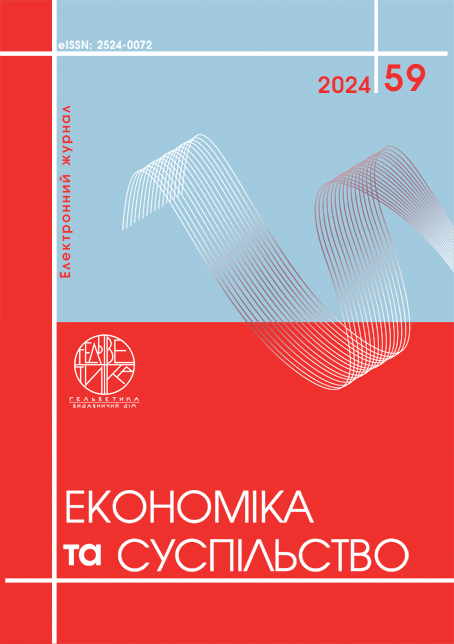ANALYSIS OF PROFESSIONAL BURNOUT FACTORS OF EMPLOYEES AND STUDENTS OF HIGHER EDUCATION INSTITUTIONS IN THE CONTEXT OF STAFF WELL-BEING MANAGEMENT
Abstract
The article justifies the necessity and expediency of managing personnel welfare, particularly among employees and students of higher education institu-tions. It provides a definition of personnel welfare management as a system of corporate strategy measures aimed at fostering the well-being of employees (physical health, psychological comfort, financial prosperity, social interaction), and consequently, team members, collectives, and all company employees. The research hypothesis centers on the impact of stages of professional burnout and factors of life satisfaction on personnel wellbeing, economic behavior and decision-making. The impact of stress factors, life dissatisfaction, toxic professional envi-ronments, low income levels, uncertainty and anxiety about the future, and other factors contribute to the professional burnout of employees and students in high-er education institutions. Based on surveys conducted among employees and students of higher edu-cation institutions, the impact of professional burnout factors among educators and factors of life satisfaction were identified. According to the research findings, over a third of educators show signs of professional burnout: 33.6% experience strain, 34.2% are in a resistance stage, and 32.2% are in an exhaustion stage. Re-garding life satisfaction factors, it was determined that 31.8% exhibit low (below average) levels of life engagement, 9.8% - overall life satisfaction; as well as high levels (above average) of life disappointment (11.2%), life weariness (9.3%), and concerns about the future (7.9%). Indicators of burnout among university profes-sors and students are closely correlated with life satisfaction indicators, including factors such as fatigue from life, life engagement, concerns about the future, and disappointment in life. The results of the correlation analysis did not show the influence of age on burnout and life satisfaction indicators among educators. Thus, these factors equally affect both young people and older individuals. The emphasis is placed on the necessity of fostering personnel welfare, par-ticularly in higher education institutions. A sequence for implementing a corpo-rate personnel welfare management system is proposed, the realization of which requires the implementation of organizational-management, socio-psychological, and educational-enlightenment measures.
References
Вартанова О.В. Діагностика раціональності в економічній поведінці майбутніх менеджерів. Економіка і суспільство. 2021. № 34. https://economyandsociety.in.ua/index.php/journal/article/view/965/923
Юрценюк О.С. Синдром професійного вигорання. URL: https://www.bsmu.edu.ua/blog/6975-sindrom-profesiynogo-vigorannya/ (дата зве-рнення: 27.01.2024 р.)
International Classification of Diseases 11th revision. Global standard for diagnostic health information. URL: https://icd.who.int/en (дата звернення: 07.02.2024 р.)
Емоційне вигорання педагогічних працівників. URL: https://ldubgd.edu.ua/sites/default/files/8_konferezii/emociyne_vigorannya.pdf (да-та звернення: 27.09.2023 р.)
Бацилєва О. В., Пузь І. В., Астахов В. М. До проблеми переживання синдрому емоційного вигорання у представників соціономічних професій. Психологічні умови благополуччя персоналу організацій: тези I Міжнародної науково-практичної онлайн-конференції, 15–17 жовтня 2020 р. Львів : Націо-нальний університет «Львівська політехніка», 2020. С. 33¬35.
Вінтюк Ю. В. Конкурентоспроможність викладача ВНЗ як умова йо-го особистого благополуччя та безпеки в організації. Психологічні умови бла-гополуччя персоналу організацій: тези I Міжнародної науково-практичної он-лайн-конференції, 15–17 жовтня 2020 р. Львів : Національний університет «Львівська політехніка», 2020. С. 52¬55.
Міщенко М. С. Особливості дослідження синдрому емоційного виго-рання за допомогою методики "Діагностика рівня емоційного вигорання" В. В. Бойко. Молодий вчений. 2015. № 4(3). С. 103¬105. URL: http://nbuv.gov.ua/UJRN/molv_2015_4%283%29__26
Мирончук Н.М. Професійне вигорання викладача вищої школи: чин-ники, ознаки, способи протидії. Теоретичні і методичні засади розвитку і само-вдосконалення особистості педагога-новатора в контексті модернізації нової української школи: зб. наук.-метод. праць; за ред. О.А. Дубасенюк. Житомир: Вид-во Євенок О.О., 2017. С. 62¬67.
Vartanova O.V. (2021.) Diahnostyka ratsionalnosti v ekonomichnii povedintsi maibutnikh menedzheriv [Diagnostics of rationality in the economic behavior of future managers]. Ekonomika i suspilstvo. № 34. URL: https://economyandsociety.in.ua/index.php/journal/article/view/965/923
Iurtseniuk O.S. Syndrom profesiinoho vyhorannia [Professional burnout syndrome]. URL: https://www.bsmu.edu.ua/blog/6975-sindrom-profesiynogo-vigorannya/ (data zver-nennia: 27.01.2024 r.)
International Classification of Diseases 11th revision. Global stand-ard for diagnostic health information. URL: https://icd.who.int/en (data zvernen-nia: 07.02.2024 r.)
Emotsiine vyhorannia pedahohichnykh pratsivnykiv [Emotional burnout of teaching staff]. URL: https://ldubgd.edu.ua/sites/default/files/8_konferezii/emociyne_vigorannya.pdf (data zvernennia: 27.09.2023 r.)
Batsylieva O. V., Puz I. V., Astakhov V. M. (2020) Do problemy pe-rezhyvannia sy-ndromu emotsiinoho vyhorannia u predstavnykiv sotsionomich-nykh profesii [To the problem of experiencing emotional burnout syndrome among representatives of socio-economic professions]. Psykholo-hichni umovy blahopoluchchia personalu orhanizatsii: tezy I Mizhnarodnoi naukovo-praktychnoi onlain-konferentsii, 15–17 zhovtnia 2020 r. Lviv : Natsionalnyi uni-versytet «Lvivska politekhnika», 2020. S. 33¬35.
Vintiuk Yu. V. (2020) Konkurentospromozhnist vykladacha VNZ yak umova yoho osobystoho blahopoluchchia ta bezpeky v orhanizatsii [The competitiveness of a university teacher as a condition for his personal well-being and safety in the organization]. Psykholohichni umovy blahopo-luchchia person-alu orhanizatsii: tezy I Mizhnarodnoi naukovo-praktychnoi onlain-konferentsii, 15–17 zhovtnia 2020 r. Lviv : Natsionalnyi universytet «Lvivska politekhnika», S. 52¬55.
Mishchenko M. S. (2015) Osoblyvosti doslidzhennia syndromu emotsiinoho vyhoran-nia za dopomohoiu metodyky "Diahnostyka rivnia emotsi-inoho vyhorannia" V.V. Boiko [Peculiarities of the study of emotional burnout syndrome using the method "Diagnostics of the level of emotional burnout" V. V. Boyko]. Molodyi vchenyi. № 4(3). S. 103¬105. URL: http://nbuv.gov.ua/UJRN/molv_2015_4%283%29__26
Myronchuk N.M. (2017) Profesiine vyhorannia vykladacha vyshchoi shkoly: chynny-ky, oznaky, sposoby protydii [Professional burnout of a higher school teacher: factors, signs, countermeasures]. Teoretychni i metodychni zasady rozvytku i samovdos-konalennia osobystosti pedahoha-novatora v konteksti modernizatsii novoi ukrains-koi shkoly: zb. nauk.-metod. prats; za red. O.A. Dubaseniuk. Zhytomyr: Vyd-vo Yeve-nok O.O.,S. 62¬67.

This work is licensed under a Creative Commons Attribution 4.0 International License.


